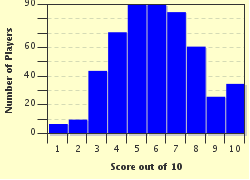Quiz Answer Key and Fun Facts
1. Who said, "In the long history of the world, only a few generations have been granted the role of defending freedom in its hour of maximum danger. I do not shrink from this responsibility -I welcome it. I do not believe that any of us would exchange places with any other people or any other generation. The energy, the faith, the devotion which we bring to this endeavor will light our country and all who serve it-and the glow from that fire can truly light the world . . . And so, my fellow Americans: ask not what your country can do for you- ask what you can do for your country"?
2. Who said, "He [Abraham Lincoln] was preeminently the white man's president, entirely devoted to the welfare of white men. He was ready and willing at any time during the first years of his administration to deny, postpone, and sacrifice the rights of humanity in the colored people to promote the welfare of the white people of this country?"
3. Who said, "Of all the dispositions and habits which lead to political prosperity, religion and morality are indispensable supports ... Observe good faith and justice towards all nations. Cultivate peace and harmony with all ... Harmony, liberal intercourse with all nations, are recommended by policy, humanity, and interest"?
4. Who said, "A life of slothful ease, a life of that peace which springs merely from lack either of desire or of power to strive after great things, is as little worthy of a nation as of an individual"?
5. Who said, "That man over there says that women need to be helped into carriages and lifted over ditches, and to have the best place everywhere. Nobody ever helps me into carriages, or over mud puddles, or gives me any best place! And ain't I a woman? ... I could work as much and eat as much as a man- when I could get it- and bear the lash as well!"?
6. Who said, "Men come and go like the waves of the sea. A tear, a tamanamus, a dirge, and they are gone from our longing eyes forever. Even the white man, whose God walked and talked with him, as friend to friend, is not exempt from the common destiny. We may be brothers after all. We shall see ... The white man will never be alone. Let him be just and deal kindly with my people, for the dead are not altogether powerless"?
7. Who said, "Happiness lies not in the mere possession of money; it lies in the joy of achievement, in the thrill of creative effort. The joy, the moral stimulation of work no longer must be forgotten in the mad chase of evanescent profits. These dark days, my friends, will be worth all they cost us if they teach us that our true destiny is not to be ministered unto but to minister to ourselves, to our fellow men"?
8. Who said, "There is no Negro problem. There is no Southern problem. There is no Northern problem. There is only an American problem ... Every American citizen must have an equal right to vote. There is no reason which can excuse the denial of that right. There is no duty which weighs more heavily on us than the duty we have to ensure that right"?
9. Who said, "I believe that it must be the policy of the United States to support free peoples who are resisting attempted subjugation by armed minorities or by outside pressures. I believe that we must assist free peoples to work out their own destinies in their own way. I believe that our help should be primarily through economic and financial aid which is essential to economic stability and orderly political processes"?
10. Who said, "Duty, Honor, Country: Those three hallowed words reverently dictate what you ought to be, what you can be, what you will be. They are your rallying points: to build courage when courage seems to fail, to regain faith when there seems to be little cause for faith; to create hope when hope becomes forlorn"?
Source: Author
seeker77
This quiz was reviewed by FunTrivia editor
bloomsby before going online.
Any errors found in FunTrivia content are routinely corrected through our feedback system.


